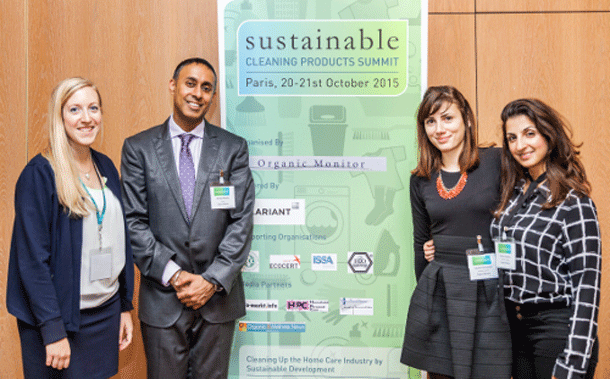

An inaugural cleaning products’ sustainability ‘summit’ has heard calls for more action to address cleaning products’ health risks and the levels of ‘green’ certification.
Organised by Organic Monitor – specialist research, consulting and training company that focuses on the global organic and related product industries – the aim of the Sustainable Cleaning Products Summit is to ‘advance sustainability in the cleaning products industry by debating key issues in a high-level forum’ stated the company’s press release.
The premier edition was hosted at the Paris Marriott Champs-Elysées on 20 and 21 October and the next edition will be hosted in Paris in November 2016. About 80 senior executives from the cleaning products industry convened in Paris to debate major sustainability issues.
‘There was a call for greater steps to address the environmental and safety impacts of cleaning products. Although there have been improvements in product formulations, there remain concerns about the health risks of contentious ingredients. The press release details some of the content discussed below:
- Tom Domen from Ecover highlighted the contrast in sustainability approaches in the industry: “green brands are preoccupied with natural chemicals, whereas conventional cleaning companies focus on the consumer”.
- Details were given on popular green certification schemes for cleaning products. Amarjit Sahota, president of the event organiser Organic Monitor, said that the industry was lagging behind others in terms of standards with less than one percent of cleaning products certified.
- A number of new green ingredients were presented at the summit. Clariant gave details of its sustainable sugar surfactants. Made from sustainable palm oil and corn, its glucamides have various applications in cleaning products. The role of enzymes in laundry products was emphasised by Gilles Mur from Du Pont. According to Mur, developments in enzyme technology were leading to shorter wash cycles and less water use.
- Procter & Gamble highlighted the need to innovate when considering sustainable raw materials; the company has partnered with DuPont to source cellulosic ethanol from corn waste.
‘The summit closed with a call for greater collaborations between stake-holders to address pressing sustainability issues. Consumer behaviour is a major concern, since the highest environmental impact of cleaning products is at use phase. Apart from responsible use, there is a need to encourage purchases of sustainable/green products,’ emphasised Organic Monitor.